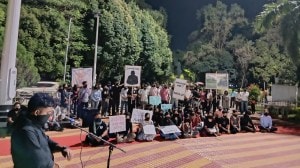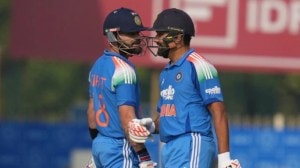Uh, like, so sorry about all that nuclear hot air
If you looked close enough, you might have detected the faint sheepishness in the western media for its excessive enthusiasm in painting doo...

If you looked close enough, you might have detected the faint sheepishness in the western media for its excessive enthusiasm in painting doomsday scenarios in South Asia.
As tensions between India and Pakistan eased, THE WASHINGTON POST confessed to the media’s appetite for destruction. It revisited someone whose job it is to feed it.
For the past month, Heritage Foundation computer expert Dexter Ingram has been using a Department of Defence doomsday computer program to wage faux cyber wars at the urgent request of some of the biggest news organisations in the US. ‘‘On a single day recently,’’ wrote the POST, ‘‘CNN, ABC News, Fox, and Time magazine were on the phone demanding that Ingram use his computer to decimate something, somewhere’’.
Only weeks ago, ABC’s George Stephanopoulos asked Ingram to use his war machine, the Consequences Assessment Tool Set (CATS), to model what would happen if India launched a nuclear strike on Pakistan.
And then there was Kashmir
For those who came in late to the holocaust that-wasn’t, the US media pointedly underlined a new development: ‘‘The world’’, that was The WASHINGTON POST again, ‘‘is finally paying attention to Kashmir’’.
Have the US and British envoys that recently trooped through the region charted a new path? Will the US and the rest confine themselves to ‘message-carrying’ between the nuclear rivals? Or is that ‘mediation’ by another name?
The Bush people are being exhorted to wade in deeper and ask questions later. NEW YORK TIMES columnist Nicholas D. Kristof rapped the Bush administration for defusing crises rather than preventing them.
He said it ‘‘…needs to rouse itself from its diplomatic duff… in the four most dangerous places in the world: the Middle East, India/Pakistan, North Korea and (in the longer run) China/Taiwan’’. His prescription: begin by appointing a special envoy for peace in Kashmir. Others looked back at the averted crisis with all-American triumphalism. ‘‘… when it comes to resolving intractable crises, there simply is no substitute for forceful American intervention,’’ wrote David Ignatio in THE WASHINGTON POST.
Change the names of the players, he suggested, and all of the tactics could be used to good effect in the Middle East.
Bush to the rescue
The reformulation of the ‘Bush Doctrine’ is working up a controversy. The US media reported that Bush has directed his top national security aides to make a doctrine of pre-emptive action against terrorist groups and states the foundation of a new national security strategy. Most see Iraq as first on the target list.
Armed with the new doctrine, the NYT pointed out, the US ‘‘reserves the right to determine what constitutes a threat to American security and to act even if that threat is not judged imminent.’’
The British greeted the news with expected dismay. The FINANCIAL TIMES spelt it out: who is to be the arbiter of whether a threat is real? Where do we draw the line between pre-emptive action against an imminent menace and ‘‘preventive retaliation’’ to head off a more distant threat?
Guardian behind the veil
Beginning Monday, Britain’s THE GUARDIAN launched a well-meaning attempt to redress the balance. An unforgiving spotlight has been turned on British Muslims, it said, especially since September 11.
Through the past week, therefore, it sent its reporters into Muslim Britain’s ghettos to retrieve the lost stories about the hopes and fears, attitudes and ambitions of the community.
The findings of a GUARDIAN/ICM opinion poll uncovered a strong belief in the community that it needs to do more to integrate itself into mainstream culture.
The GUARDIAN did not spare its own tribe either: Media stereotypes of the community were dragged out for debate.
Dream on, Bollywood
The British media wasn’t impressed by the A.R. Rahman-scored musical Bombay Dreams, which opened in London this week. Meera Syal’s story of a boy from the Bombay slums who dreams of stardom and falls in love with the daughter of a movie moghul, noted the GUARDIAN, mockingly contrasts the shiny fantasy of Bollywood movies with the grim reality of Bombay life.
But Bombay Dreams, said the critic, is at its best when it sticks close to the very formula it derides. The best bits come when the stage is given over to ‘‘deliriously dotty Bollywood set pieces: the kind of pop spectacle Syal’s story affects to scorn’’.
- 01
- 02
- 03
- 04
- 05































